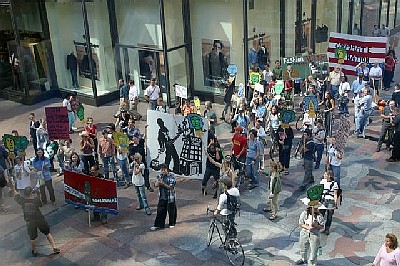Roughly 80 persons protested the World Trade Organization (WTO) in downtown Minneapolis today (Friday) in solidarity with workers and farmers throughout the world. The demonstration was timed to correspond with the meeting of the WTO in Cancun, Mexico. (article 1)

The protest began at 12th and Nicollet. Speakers shared information about how globalization and corporate greed affects Minnesotans. One union worker from the University of Minnesota mentioned that some companies, including the University of Minnesota, are letting persons opt out of healthcare coverage. This is an option that a poor person is likely to take that will place a bigger burden on the country to cover expenses for uninsured. Another factor mentioned was the selling of the University Hospital to a corporation. Focused on profits, the University Hospital now has a harder time funding quality education for residents and other healthcare professionals because such work is not lucrative for the parent company. We all suffer as a consequence.
After several speakers presented to the group, many persons (some had to leave) marched toward Washington Ave on Nicollet mall. Many protesters carried signs of hand-drawn faces symbolizing persons at specific Minnesotan companies who had lost their jobs due to unfair trade policies.
As I was photographing the event, I heard many bystanders on the crowded mall remark that they didn't know what the WTO is. This is not too surprising given the paucity of media coverage of the WTO actions and the problems many nations face because of its policies.
I was initially pleased this evening when I turned on the News Hour (PBS) and saw that a segment was devoted to the WTO, the international body that deals with the rules of trade. The WTO negotiates trade policy through member nations' representatives, and the wealthy nations' representatives are strong advocates for multi-national corporate policy. The News Hour showed video footage of thousands of protesters in Cancun confronting police at a fenced-in area surrounding the meeting place of the WTO representatives. Next, the News Hour interviewed Amy Chen, a Chinese Filipino and a professor at Yale who wrote a book titled « World on Fire: How Exporting Free Market Democracy Breeds Ethnic Hatred and Global Instability. » The thesis of her book is that globalization has caused ethnic hatred because in many regions a small ethnic minority controls a majority of trade and wealth. For instance in the Philippines, ethnic Chinese control 80% of the nation's wealth. The same is true of Indians in East Africa. According to her analysis, these ethnic minorities are better educated and better prepared to take advantage of trade opportunities. This breeds jealousy and hatred in the ethnic majority that is poor. In response to the presentation of her ideas, another expert argued in favor of globalization by noting that her ideas do not hold in countries like Korea, a reported globalization success story. The audience of the news hour is left believing that the anti-WTO demonstrators are a group of uneducated persons who are simply jealous of successful businessmen. I WAS SHOCKED BY THIS COVERAGE.
This coverage on the News Hour represented an incomplete view of the problems associated with the WTO. Korea was named as a success story and that is true if you compare the prosperity of South Korea, a country open to trade, to North Korea, its insular neighbor. However, that must not be the entire story or Lee Kyang Hae, a South Korean rice farmer, would not have killed himself this week in Cancun out of frustration with WTO policies (his photos are on Indy Media Cancun; also check out one of my photos of a demonstrator in Minneapolis who carried a sign with Lee Kyang Hae's name on it). I also saw several persons who looked Korean in the footage of the News Hour demonstrating at WTO in Cancun.
Why the discrepancy between what was discussed on the News Hour and what I saw? What the News Hour failed to mention is that many wealthy nations subsidize farm products. For instance, the United States subsidizes cotton, rice, soybeans, corn, etc. Taxpayers foot the bill to the tune of billions of dollars each year. The end result is that many small-scale farmers in poor nations (and in the U.S.) cannot grow their crops for the price large-scale subsidized farmers in the U.S. can sell their products (it's called « dumping »). Persons in Western Africa are starving because of this policy http://politics.guardian.co.uk/comment/story/0,9115,1020722,00.html ) http://www.guardian.co.uk/guardianweekly/story/0,12674,913255,00.html http://www.namibian.com.na/2003/August/marketplace/03F20B8237.html ), Korean farmers are at the breaking point, as are farmers in many other nations. Ending these subsidies from rich nations would do more to create jobs around the world (e.g., 11 million cotton farmers in Africa alone) than any other single action. Why don't corporate media cover this shameful action and let U.S. citizens know how our tax money is subsidizing rich corporate farmers? I wish I had the answer. So do the starving poor around the world.